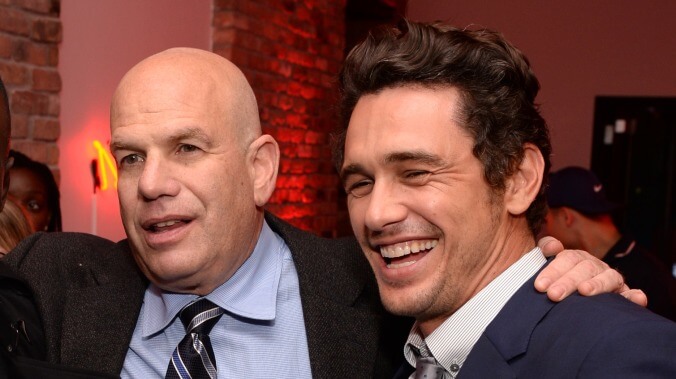There have been public allegations of sexual impropriety against actor James Franco stretching back for roughly the last five years, dating back to a 2014 incident in which he was seen flirting with a 17-year on Instagram. (Legal, but questionable, which eventually became something of a theme.) Since then, the occasional allegations against him have varied between spoken—most prominently, when a former girlfriend accused him of exposing himself to her, and when a number of students at his acting classes sued him on claims that he’d leveraged fame and the potential for career advancement in order to get them to film sexually explicit materials—and merely hinted at. (It’s still not public knowledge why actress Ally Sheedy suggested, back in 2018, that Franco was related to her decision to leave film and TV acting for good.)
The previously mentioned lawsuit—building on allegations made in an L.A. Times story from 2018—has put renewed focus on Franco’s various projects, most notably his role on HBO’s sexually themed porn drama, The Deuce. This week, Rolling Stone’s Alan Sepinwall questioned that show’s creator, David Simon, about the allegations against Franco—and received a typically Simonian font of novelistic rage in response.
David Simon, it emerges, does not much care for the way the media has covered the James Franco allegations, saving especial venom for The L.A. Times for treating Franco as though he were “a sexual predator at worst and a sex pest at best” for the ways he has been accused of exploiting power dynamics inherent to his role as a director, producer, teacher, and star. Simon argues (aggressively, angrily, and sometimes eloquently) that Franco’s actions have been flattened into the wider #MeToo movement, drawing explicit parallels between, say, yelling at students because they refused to go topless for a scene (as Franco has been accused of doing) with The Deuce s own struggles with finding the right lines not to cross when filming sexual material. (The Deuce is especially notable for having responded to its own mistakes by adding an intimacy coordinator to the show’s staff, ensuring that performers always have an advocate on-hand to help them navigate the obligations and comforts of filming sexual content.)
Here’s Simon, venting some spleen at the coverage of the Franco allegations:
If we waited around for a reporter anywhere, or, frankly, a television critic to be careful and make a coherent distinction about what James did or didn’t do, we’d be waiting forever. No one in your profession had the courage to assess this with as much deliberation as I’ve just offered you. I find it really disappointing on the part of people who I very much admire in your line of work, who are ready to restructure our show, or write our show off, or even write off the work that James himself had done, that were making some of these fundamental arguments without being careful, and without being thoughtful. As an ex-journalist, I resent it. It’s a complicated job. But it requires a lot more thought than was delivered in this situation.
In his responses, Simon repeatedly characterizes Franco’s sins (to the extent that he’s willing to speak to them at all) as ones of judgment, rather than intentional mis-use of power. In his version, Franco is a sort of innocent—a sexually liberated creature bathed in a reality-fraying sea of celebrity, who doesn’t understand that asking a woman to perform sexual actions on-camera comes loaded with potent, potentially career-destroying discrepancies in power. Or, in Simon’s own words: “Well, for one thing, he’s spent a lot of years being about as extroverted and public a figure as one can imagine; his own boundaries with regard to self-exposure are pretty damn minimal. He’s also blandly comfortable with, if not entirely engaged by, themes of adult sexuality; IMDb says as much. There’s a reason we cast him in this piece.”
Simon seems especially pissed to see Franco included with men like Harvey Weinstein and Les Moonves, who allegedly used their power to get women to have sex with them. Making art about sex is hard, Simon argues—pointing repeatedly to his and his fellow producers’ own mis-steps as he does—and if Franco wasn’t as careful as he should have been in phrasing his requests while filming a low-budget movie on the topic, that doesn’t make him a proper target for #MeToo.
Except that it explicitly and precisely does; as NPR’s Linda Holmes argued (more eloquently than we ourselves could) in a Twitter thread earlier tonight, Franco’s allegedly unthinking abuse of his power is exactly the sort of dynamic #MeToo and TimesUp were designed to combat, an atmosphere of unexamined actions with undeniable harmful effects. “What is frustrating,” Holmes writes, pointing to Simon’s own obsession with broken systems, “Isn’t being asked to consider that not all these behaviors are the same, but being denied the basic understanding that they operate as parts of a single system. And that system is complicated, and not entirely populated by villains. Reducing this public conversation to a list of untouchable men is what makes it seem normal to spend our time debating every gradation of badness, rather than saying: We all need to pull together to improve the functioning of this system.”
You can read Simon’s full response (including, it should be noted, a call for Hollywood unions to push for more and better regulations for how sexual content is filmed) to Sepinwall’s questions about Franco here.

